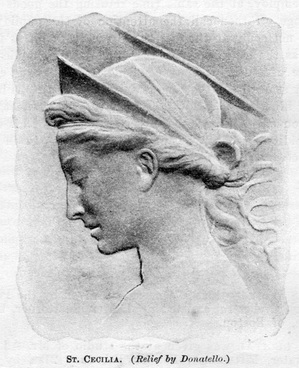BY W. J. BALTZELL.
The Greek mythology represented music by one of the Muses, giving it a special divinity in accordance with their custom. As we know, the Christian church in its early days followed many of the customs of the various peoples who came into connection with the new faith. It is a natural parallel that the early Christian church should assign a patron saint to music, in this case, the special province being ecclesiastical music. So we have, as a parallel to the Muse, St. Cecilia, the patron saint of church music.
As may be learned from the sketch of St. Cecilia in the preceding column, the Christians of her time were subject to the severest persecutions. Such conditions prevented the development of an artistic church song. Meetings were held in the catacombs and other obscure places which could not be permanently fitted up with the instrumental support afterward developed.
The music of the early church was a rather heterogeneous mass taken from various sources. Those members who were Jewish by birth must naturally have used the songs they learned in their own land. Those who were of Grecian birth and lived in Greece adapted Greek songs to their needs, and the Roman Christians used the songs to which they were accustomed. The psalms used by the early Christians were chanted antiphonally, and since all esteemed it a privilege to assist in the service, the music must have been within the capacity of the least skilled among them. There being no simple means of notation, the songs were transmitted from generation to generation by oral tradition only.
The music of the early Christians must have been purely vocal, since the members of that faith regarded the use of instruments as the mark of pagan instincts.
The feasts of Bacchus and Venus were marked with all manner of vicious customs and instrumental music used to heighten the frenzies into which the participants worked themselves.
Thus we may see that St. Cecilia could not have known a very artistic church song. It was not until after the conversion of Constantine, about a hundred years later, that the church was no longer compelled to worship secretly, and that schools were established.
The character of St. Cecilia and her acceptance as the patron saint of music may be taken to typify beauty and purity in music. We know of the vow she made, and how inviolate she lived and died, and here we may also read the obligation laid upon us to preserve our art pure and spotless from all vulgarity and cheapening.
At this day there is much need for the public to study and to heed this lesson of our duty to seek only the purest and best that music can be to us. Just as in the days when St. Cecilia lived, the dissolute followers of the pagan divinities used music to make attractive their lascivious and wanton revels; so to-day many of those who purvey for the great public appeal to the coarser tastes and never neglect to make a strong showing of the musical attractions they have to offer. It is for those who are earnestly devoted to the art to keep up the loftier, purer aims which music deserves. Taste is a matter of ideal, and low ideals can never develop a high and a refined taste. Musicians can well afford to preach and to practice the doctrine of a pure and a refined musical training, and to resist, with all their powers, the encroachment of the common and vulgar in music.
We may never be called upon to make the extreme sacrifice that St. Cecilia made, yet there will be times in our lives when we may be obliged to sacrifice some dearly-loved methods, some warmly cherished hopes, and submit to misjudgment rather than abate one jot our advocacy of the purest and best music, and our reward is certain. Even if some of our neighbors, aye, even some of our professional brethren and sisters, laugh at us for our sturdy upholding of the banner of purity in music, even if they seem to be gaining in popularity at our expense, the tide will turn. People respect the man who sticks to his views, especially when his views are the true ones.
Let those who seek a popularity based on a low standard have all they can gain. Our aim shall be to work unceasingly to spread a love for all that is good in music and to increase the earnest cultivation of the highest and best that music can be to us and can give to us.




